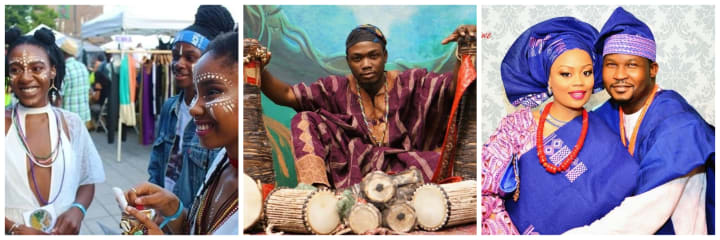Welcome to Yorubaland
“Fear a silent man. He has lips like a drum.”—Yoruba Proverb

The Yoruba are a diverse group of people who are united under a common language, religion, and cultural unity. Yorubaland (Early History: Pre-1500 to the Pre-Colonial Period: 1500-1800) was a country located in present-day southwest Nigeria, West Africa.
The country displayed scenic views of the Niger River, tropical rainforests, grasslands, mountains, hills, lakes, streams, creeks, and lagoons leading out into the Atlantic coastland. Before Yorubaland was conquered and colonized under British rule during the 19th and 20th centuries. The land was inhabited by a homogeneous group of Africans who called themselves “Yoruba.”
Along with Nigeria, Yorubaland consisted of the territory of present-day countries Benin and Togo. The ancient Yoruba’s were a very simple people in their manners, tastes, and habits. For example, no other ethnic group throughout the African continent is more remarkable for their cautiousness because the safety of their country was held as the highest priority.

Yoruba Men and Women
The Yoruba as an ethnic group is characterized as social, polite, and supremely hospitable. Their natural, timid, and submissive nature can effect by diplomacy what they can’t accomplish by force. The Yoruba spiritual way of approaching life differed widely from other ethnic groups in Africa, but they were no less determined to accomplish their goals.
Within Yoruba society, hunting developed into a profession using tools such as iron-bladed machetes, knives, arrows, spears, and traps. From Yoruba Folklore, hunters were highly regarded within the country. Besides contributing to the meat supply, the lore of the Yoruba hunters also played an important role during the development of Yoruba religion. The Yoruba believed the dead went to another place of existence, from where they could see, interact, and help humans in the world.
When Yoruba hunters passed away, they were buried with clothes of personal adornment, and food in order to help them settle in their new-world homes. The Yoruba believed the newly dead were believed to be welcomed “home” by family members who passed away earlier. One way the living could honor their family members in the afterlife was to have an expensive and prestigious funeral.
For instance, if a deceased Yoruba hunter was great in his “earthly” life, the Yoruba believed the spirits of the animals the hunter killed while on expeditions could ambush him, making his journey to heaven unpleasant. The hunter’s children could help their deceased father on his journey to heaven by building a life-size statue of him, and dressed the statue in his clothes. The Yoruba believed the wild animals would fix their attention on the statue, and not the hunter, allowing the hunter to continue his journey undisturbed to heaven because of the help from his children.
From early times of the Yoruba people, they never saw the need for a standing army, or the need for any trained soldiers. According to the customs of Yorubaland, every man who was capable to bear arms was expected to serve in war. This law was compulsory for Yoruba men and women of rank and title, and for defense of Yorubaland.
In the centuries of Yorubaland’s great wealth and influence, the country felt safe enough to not have a significant military presence, but they still built large fortified walls around their multiple kingdoms to keep intruders at a safe distance. When powerless, the Yoruba would submit to oppression to any extent. Their patience allows them to put their plan in motion and embrace the opportunity to overthrow their oppressors.
The Transatlantic Slave Trade forcibly transported millions of Yoruba, and other African ethnic groups to the Americas for free slave labor. This inhumane experience forced the Yoruba and other African ethnic groups to leave their tribal wars behind on the African continent. Once the slave ships landed in the Americas. Different African ethnic groups planned, and moved as “One” African collective, and revolted against their oppressors.
One could only imagine what Yorubaland, and Africa’s other lost, but not forgotten empires (Songhai, present-day Mali, West Africa) and kingdoms (Ashanti, present-day Ghana, West Africa) would be in the 21st century if Africa hadn’t been invaded, conquered, and colonized by foreigners hundreds of years ago.
Sources:
Akintoye, S. The History of the Yoruba People. Amalion Publishing. Jan. 1, 2010. Aug. 1, 2019. p. 328, 337, 346, 329, 642, 871, 867, 880, 889, 1952, 1960, 7994, 8121, 8802.
Johnson, S. The History of the Yorubas from the Earliest Times to the Beginning of the British Protectorate. Forgotten Books. July 3, 2012. Aug.1, 2019. p. 98, 102, 131.
About the Creator
Darryl C. Richie
Inspirational Speaker, Author and Blogger looking to inspire with my story of being a two-time cancer survivor and hip amputee, and connect the African Diaspora to their African roots via Black Consciousness.






Comments
There are no comments for this story
Be the first to respond and start the conversation.